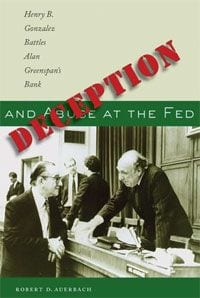
Robert D. Auerbach doesn’t like Alan Greenspan. Or perhaps he just doesn’t like what Greenspan represents. The often praised, rarely criticized, former overseer of the Federal Reserve represents all that is wrong with that most bureaucratic of behemoths.
In the view of Auerbach, the Federal Reserve is an institution rife with incompetence, illicitness and illegalities. Under the leadership of Greenspan, it perverted political process, remained disturbingly opaque in its inner workings, and stymied oversight through Greenspan’s Machiavellian machinations. And Auerbach likes oversight. Or, at least, he shows remarkable admiration for a man who was largely responsible for performing such oversight as part of the House of Representatives Banking Committee, Henry B. Gonzalez.
This sets the stage for the rather awkwardly titled, Deception and Abuse at the Fed: Henry B. Gonzalez Battles Alan Greenspan’s Bank. Nonetheless, the title is apt in that it at least describes the author’s intent; to recount a litany of offences committed by the Federal Reserve over the last half a century, relating such incidents whenever possible to his two eponymous characters. He covers three topics, each of which might have led to an interesting and complete work, but when combined inevitably detract from one another, resulting in the text being as awkward as its title.
Auerbach begins with an homage to the his former boss and mentor, Henry B. Gonzalez. The long-serving public servant, House Representative, and one time Chairman of the House of Representatives Banking committee is portrayed as a man deserving much greater praise and acclaim than he ever received. Numerous references are given to his good character and dutiful deeds, often as a counterpoint to the nefarious Greenspan. But in the end many of the references seem like they would be better suited to a biography of the man himself. Unfortunately, though the author’s obvious adulation might incline him to write such a book, the relative obscurity of Gonzalez would incline few people to read it.
Cynically, one might conclude that the inclusion of Greenspan is merely a device to overcome that very flaw, seeking to cash in on the former Fed Chairman’s notoriety. But it quickly becomes clear that, while such thoughts undoubtedly crossed the publisher’s mind, Auerbach truly abhors Greenspan and everything he purports to represent.
His second topic seems to be a response to the excessive praise heaped upon the former Fed Chairman. As such, it might have presented an interesting critique of both the man’s character and his policies, but the response is couched in such petulant and combative terms as to remove any trace of objectivity or credibility. It is clear that he places much of the blame for his former mentor’s marginalization on Greenspan shoulders. While this may in part be true, it is an oversimplification, worse, it exacerbates the clearly subjective style of the rest of the text.
The final topic is a critique of the Federal Reserve. From theft, to fraud, to political cover-ups, Auerbach attempts to paint a damning picture of an immoral, self-serving institution gone horribly wrong. Unfortunately, his obvious bias impedes him from placing such failures within context.
He site’s incidents leading to the cumulative theft of a half million dollars as a catastrophic failure of the bank’s security measures. Yet, this is despite the literally trillions of dollars processed over that same period, the fact that the perpetrators were by and large caught, and their methods identified. More importantly, he avoids suggesting what security measures could have been undertaken and addressing whether the costs of such additional security would outweigh the relatively small sums they were seeking to protect.
This especially seems petty and overly judicious when weighed against the billions of dollars extended in unauthorized loans to Mexico and its incompetence in oversight of, or possible complicity with, a bank that funnelled five and a half billion dollars to the government of Iraq during its war with Iran on behalf of the American, British, and German governments. Though he provides plenty of evidence by way of memorandums and quotation of key sources to support his most damning criticisms, their weight is lost beneath the sheer multitude of petty accusations which are more easily ascribed to jurisdictional squabbles, personal alliances, and the fallacious foibles attributable to all such bureaucracies.
Auerbach’s obvious allegiances and failure to maintain a sense of objectivity result in a work that seems rather shrill and churlish. As such, the book leaves little to recommend it. Though there are informative and interesting moments they are easily missed and it must be said that you will be missing little if you never happen to pick up this book at all.

![Call for Papers: All Things Reconsidered [MUSIC] May-August 2024](https://www.popmatters.com/wp-content/uploads/2024/04/all-things-reconsidered-call-music-may-2024-720x380.jpg)



